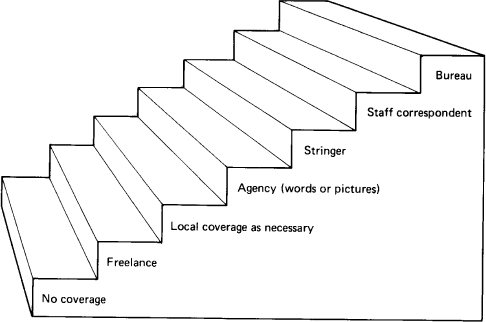Covering the World
Some issues and processes assume an international dimension–changes to the global economy, the breakdown of old orders and old certainties, the famine and disease of some countries and the pollution or consumption of others. The war in Bosnia was described by some journalists as the war you could catch a bus ride to. The Gulf War was fought not only in the desert, but in our homes in every news bulletin. The effect of television news is built into the military and diplomatic policy of many governments. Social commentators will provide volumes of research on the news values of the media, but the journalists will maintain that they are primarily interested in those events which will have some direct bearing on the audiences they serve.
Sources
Despite the often-criticised parochialism of television news, coverage of foreign issues does remain an important ingredient. For the big, internationally minded services whose audiences have come to expect same-day coverage of every important happening, it is also usually by far the most expensive part of their news-gathering operations, and every unexpected foreign story of real significance adds another strain to budgets which are frequently already overstretched.
Television receives foreign news from several main sources:
● Local news services offer coverage of their own domestic events to the international news exchanges, which swap material between member countries over semi-permanent circuits several times a day.
● International wire services or news picture agencies have resident correspondents stationed in or close to most important international centres, and provide a large proportion of the raw material.
● Freelance journalists make their living from serving several outlets, although they may also be paid retainers by their best customers as a means of ensuring that they provide a minimum service.
● Stringers, who owe their first loyalties to the organisations which employ them, are also able to provide material to others on an irregular basis. Both these categories contain people who may not be full-time journalistic practitioners.
● Resident correspondents are based in countries from which the flow of important news is considered regular enough to justify the expense of having staff journalists permanently assigned.
● Foreign bureaux consist of several correspondents and ancillary staff established in particularly important centres where the presence of only a single correspondent would not be sufficient.
● The ‘fire brigade’ is made up of general reporters who are sent out from home base to cover specific stories, or to back up freelances, stringers or correspondents.
● Other methods of gathering foreign material include the systematic monitoring of foreign broadcasts, often the first accurate source of ‘official’ news.

Steps to world news coverage
News organisations grade their overseas representation according to the importance they place on an area. But foreign coverage is approximately three times as expensive as ‘home’ news, so, at the highest level, sharing bureaux and facilities with broadcasters from other countries’ services can make economic and journalistic sense.
